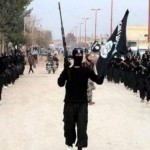In recent weeks and months, discussions about the United States and allies becoming militarily involved to combat the Islamic State (hereafter referred to as ISIS) in  Iraq and Syria have become quite serious. Much of these discussions revolve around an idea that the United States and others could provide weapons and military supplies to rebels in Syria, and may even put “troops on the ground” in Iraq. The goal of this mission would be, as Obama stated on September 10, 2014, “to degrade and destroy ISIL (ISIS)”. It is important to first understand what comprises ISIS. In a presentation given on Sept. 18th, 2014, Haroon Ullah, a strategist for the State Department on extremism in the Middle East gave a detailed picture of how ISIS was formed and currently operates. Here, the organization that has branded itself as ISIS was presented in very business-like terms. Its power comes through economic means, including access to natural resources such as oil fields, financial resources through the seizure of banks, as well as the sale of antiquities. Indeed, Mr. Ullah presented the formation of ISIS as a company, with an IPO where regional wealthy individuals gained a stake in the organization, expanding the access to funding for ISIS.
Iraq and Syria have become quite serious. Much of these discussions revolve around an idea that the United States and others could provide weapons and military supplies to rebels in Syria, and may even put “troops on the ground” in Iraq. The goal of this mission would be, as Obama stated on September 10, 2014, “to degrade and destroy ISIL (ISIS)”. It is important to first understand what comprises ISIS. In a presentation given on Sept. 18th, 2014, Haroon Ullah, a strategist for the State Department on extremism in the Middle East gave a detailed picture of how ISIS was formed and currently operates. Here, the organization that has branded itself as ISIS was presented in very business-like terms. Its power comes through economic means, including access to natural resources such as oil fields, financial resources through the seizure of banks, as well as the sale of antiquities. Indeed, Mr. Ullah presented the formation of ISIS as a company, with an IPO where regional wealthy individuals gained a stake in the organization, expanding the access to funding for ISIS.
With this in mind, it is important to see ISIS as a compilation of many groups that are held loosely together. They should not be seen as one group moving through village by village gaining territory. Rather, they are presenting an economic and political option to structure various groups of village leaders. Having developed this view of ISIS, it is interesting to consider the perspective of Carl von Clausewitz’ who fleshes out the
Islamic State and US/UK Intervention idea of a “center of gravity.” According to Clausewitz, one must look for the point on which most or all else depends.
Here it seems that the “center of gravity” revolves around the idea of public diplomacy. Identifying public diplomacy as the main focus for handling ISIS presents a direct contradiction to the idea of military intervention. Let us first address the idea that support should be given to rebels in Syria. In a NATO statement these groups garner the title of “moderate opposition” to the Syrian regime’ “tyranny” and ISIL’s
“extremism.” The idea that there are moderate groups to arm seems an absurd assertion, and one with little to no evidence. Indeed, it could seem an impossible word for any group operating in a war-torn country, cut into factions by internal conflict. Secondly, it is important to consider an intervention in Iraq, including potential combat troops. In recent days, General Dempsey, Chairman of the Joint Chiefs of Staff has stated that he does not anticipate any type of engagement. The mission would strictly
be advisory. And yet, he Dempsey leaves open the possibility that a combat mission may develop as necessary. One of the most prominent arguments against this kind of military intervention is that it would
legitimize the militant ISIS and  potentially contribute to its growth worldwide. According to J. M. Berger, a terrorism researcher, a United States war against ISIS could reverse the localization of jihadist movements in recent years to unite the currently splintered extremist
potentially contribute to its growth worldwide. According to J. M. Berger, a terrorism researcher, a United States war against ISIS could reverse the localization of jihadist movements in recent years to unite the currently splintered extremist
groups in a regional rife with identity conflict.
This situation is highly complex, and any deep analysis reveals the vast
number of stakeholders. The notion of going in to strike at ISIS militarily misses the idea of the full conception of the organization as an economic, political and cultural force. A true idea of what is at stake should be allowed into the discussion, before deciding that another military intervention will arrest the development of what is already the largest extremist group in the world. When looking at the immediate developments, ISIS seems to be expanding and a military intervention could temporarily protect a frail Iraqi government and contain the geographical influence. When looking more long-term, extremism is created through a set of conditions, in which a military intervention has no power to impact.
William Duncan

